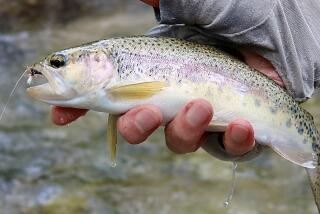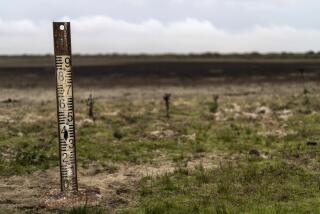Lifting of Iron Curtain Endangers Rare Stork Colony : Environment: When the barbed wire came down, the humans came. Some of those humans want to build hotels.
- Share via
DEVIN, Czechoslovakia — In the old days, the swampy strip between the Danube river and the Iron Curtain was a deadly no-man’s land and a little piece of heaven for a few dozen storks.
In the shadow of guard towers, these shy and awkward-looking birds could build nests and grub for insects free of human interference.
Today the barbed wire is gone, the guard towers are empty and the storks are in trouble.
Fishermen and tourists regularly tramp through this paradise, disrupting the storks’ complex nesting and feeding habits. More ominous is a recent invasion by investors and real estate agents scouting for sites for hotels and recreation centers.
On the side of the storks is a small army of environmentalists who are demanding government protection for these rare animals and hundreds of other species living in a narrow patch of unspoiled territory along the old East-West frontier--perhaps the sole positive legacy of the Iron Curtain.
“We have an area here that is still very natural, partly because of the Iron Curtain,” said Alexander Zilke, a spokesman for the Vienna chapter of the World Wildlife Fund. “We must never let it become an area for industrial sites and housing projects.”
The WWF and nine other environmental groups from Austria, Hungary and Czechoslovakia have launched a campaign to ban commercial development in the newly opened buffer zone, ranging in width from a few yards to three miles, between the old barbed wire barricades and the actual international boundaries.
This inadvertent nature park is “unique in Europe,” said Zilke, “the last remains of this type of ecosystem on the continent.”
It encompasses wetlands and alluvial plains like those near the Czechoslovak town of Devin, where more than 30 nesting pairs of storks form one of the last natural stork colonies in Europe.
Farther downstream, as the Danube snakes its way into Hungary, are lush meadows and forests that form a green oasis in an environmentally blighted region.
The double rows of barbed wire fences that once preserved this wilderness at the expense of Eastern Europe’s freedom have been gradually pulled down in most areas over the last few months. In Devin, all that remains is the occasional spool of rusted wire and an endless row of concrete and wooden fence posts.
Activists like the WWF’s Karl Wagner are concerned that developers from East and West will soon be stampeding into the area like race horses through a starting gate.
“We are hearing again about a number of projects that have been waiting in desk drawers for years--new border crossings, navigational canals, power plants, extensive agriculture and tourism,” Wagner said.
In an attempt to block this type of development, the 10 environmentalist groups issued a “Danube Charter” that calls for government protection of the land, including the creation of a huge park that would run along both sides of the Danube river where it forms the border between Austria, Czechoslovakia and Hungary.
The charter urges a permanent ban on such “megaprojects” as the Gabcikovo dam and hydropower plant in Czechoslovakia, which is already 90% complete, as well as the proposed Danube-Oder-Elbe Canal.
“Such projects would cause the final destruction of the still abundant resources of ground and drinking water, soil and biological diversity,” the charter states.
To back up the document, the environmentalists pledged to put strong pressure on their legislatures until the basic principles of the charter become law. But the signers concede the proposed trans-frontier park will face opposition from special-interest groups in all three countries.
“We can’t even get a national park in Austria because the interests of the various construction lobbies and energy lobbies is so strong that the government (won’t) do what it promised to do,” said Freda Meissner-Blau of the Austrian-based group ECOROPA. “It would be even that much more difficult to join in with two other countries.”
As an added insurance for the storks and other wildlife, the WWF, which sponsored a media tour of the border areas, has begun buying up large parcels of marshland on the Austrian side of the Danube in case the park idea falls through.
More than 1,000 acres already have been purchased using some of the nearly $3 million the group has collected from private citizens and corporations.
“There is a very strong fight for the last remaining natural habitat along the Danube,” said Hartmut Jungius, director of the WWF’s European division. “With the purchase of this land, once it is completed, there will be no future at least for hydroelectric plants along the Danube in Austria.”
And that, in the WWF’s view, means there may be a future for a few dozen storks.
More to Read
Sign up for Essential California
The most important California stories and recommendations in your inbox every morning.
You may occasionally receive promotional content from the Los Angeles Times.










